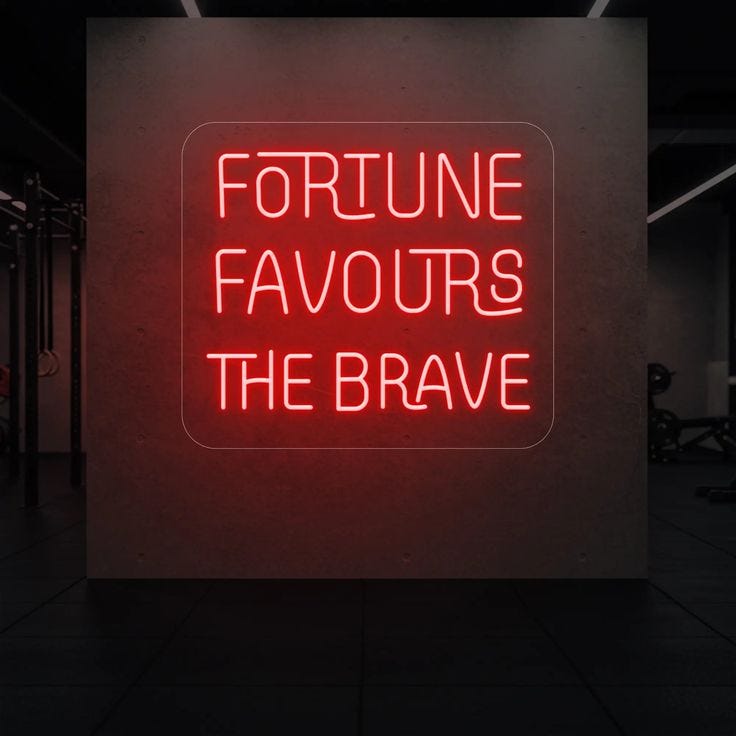Making the decision to quit my career, give up my executive salary and jump headfirst into starting my own company was not a big decision for me.
I know it sounds arrogant, as if I’m this ultra-confident person who has no fear or anxiety about doing something they’ve never really done before. But the truth is, I really wasn’t nervous, uncomfortable or even scared. Before I even got to the point of wanting to start something on my own, I had long lost the desire to continue on the same path as I had for the past 20+ years.
My reasons included the following:
I no longer had a desire to “do HR” work. In fact, I was so dulled by doing HR that I realized I had been doing turnarounds (mercenary work) for difficult startups that needed transformations more and more often. I eventually started to gain a reputation for being “that HR mercenary” that would go in and do what needs to be done. Oddly, even that eventually got boring. Most of the founders I worked with never ended up replacing me after I moved on. Many told me that they would rather have no HR than try to find someone who could duplicate me.
I no longer needed a boss. I’ve had my share of bad bosses like everyone else but for the most part, I really enjoyed working with the majority of Founder CEOs that were my managers. But I realized that I was eventually calling them my “partner” versus my “manager” which to me, signalled that I was really operating as my own boss. I had stopped asking for permission a long time ago and the truth was, many founders I worked with didn’t even know what my job should look like. I crafted my own strategies, my own development and my own rules. After a while, you crave someone who can truly challenge you.
I really didn’t like doing the things that a “manager” needed to do. My daily schedules were always the same: Daily standup | 1:1 meetings | Team meetings | Executive meetings | Board Meetings | KPI update | OKR update | Onboarding | Offboarding | LRP Meeting | Post-mortem Meeting | All Hands Deck | Quarterly Town Hall Deck | Board Deck... and then rinse and repeat. Being a manager seemed to involve a lot of talking, not a lot of doing. That killed my soul a lot and dulled my senses. I honestly detest meetings and I need to execute versus talk endlessly about how to execute on the never-ending plan. Just move out of my way and let me move fast (that’s what I’m always thinking during meetings).
You don’t really get to choose who you work with. This one is personal for me. Besides having the option to choose your direct reports (at least the ones you didn’t have to adopt), you don’t often choose your peers, your colleagues, your stakeholders. What was tough for me was having to work with people that I felt weren’t good enough (or sometimes good at all). Mediocrity is something that creeps up at a company as headcount increases and the business matures. Without critically holding every individual accountable, “great” becomes “good enough” and that’s how high performing companies start to die. This one hurt me a lot and I found it hard to just accept it. People thought I was weird that this got to me more than the founder. And that’s when I asked myself, why should I care more than they do? The reality is, I shouldn’t. I’m not the founder.
When you think about everything that was going on in my head and the fact that these sentiments were multiplying year over year, it really was no surprise that I would turn my back on working for a company again and burn the boats behind me.
The companies deserved better, and I deserved better. We would be doing each other no service.
So starting 5 to 9 Society was inevitable. My first thought was, maybe this will just be a fun side gig with 20 members and I can diversify my time doing other things. Sounded like a good plan until I realized how interested people were in joining the Society, an exclusive executive network built for high-performance operators, founders and investors. I like to call it the “secret society” to pay homage to how I’ve networked over the past decade - in confidential circles where opportunities were whispered and meetups were through exclusive invites. This was my world outside of work - and now my work is building this world.
Every founder who has ever started their own company builds with purpose. I remember working at companies where employees decided what the core values should be for that company. They wanted a stake in what each core value should be because they were working there. But the truth was, those employees won’t be there forever. They will likely stay on for 2-4 years and move into new companies so why should the core values be something the employees should create? It should be created by the founders because long after everyone has moved on to new jobs, odds are the founders will still be there. Rather than creating values to align with current team members, founders should be creating values that align with the right people who join the company. The alignment will draw the right people to you and repel the wrong people from you.
Building 5 to 9 Society has been energizing and it feels right because I’m exactly where I need to be. The early adopters that have joined the Society weren’t difficult to convince to join. They understood the purpose and aligned with the vision. I didn’t need to influence them beyond one initial phone call (I vet every single member that joins) - they truly understood the assignment because they aligned with the mission.
I appreciate early adopters so much because the truth is, I’m also part of that camp. I’ve been an early adoptor of software, new talent, new founders and early stage startups. If the vision aligns with me, I have faith that it’s headed in the right direction. I don’t need proof, statistics, analysis and data. I believe, and that can be a powerful thing.
Don’t believe me? I get it, so many of us are trained and taught to put data before everything. Sure, to be safe, data will try to give you what you desire as an outcome, but it’s also never guaranteed or we’d all be millionaires. Sometimes enormous wins are often based on a bet. Here are a few examples:
1. Star Wars (1977)
Industry: Film
George Lucas self-financed parts of the project, turned down his director fee for merchandising rights (which the studio thought were worthless), and insisted on creative control.
Why it worked: Vision. The studio had no faith. Test audiences were confused. But Lucas saw the cultural white space. It became a $10+ billion franchise.
2. Spotify Wrapped
Industry: Tech/Product
Wrapped was built in a hack week - not market tested, no data predicting virality. Just intuition that people would want to see and share their listening habits.
Why it worked: It turned a private behavior (music taste) into public identity. Zero playbook. Massive brand lift. Millions share it annually.
3. Humans of New York
Industry: Media/Photography
Brandon Stanton was a failed bond trader with no photography background. He started taking street portraits with no business plan or data proving it would resonate.
Why it worked: Human stories told simply and consistently. No SEO tricks. No data. Just raw, emotional truth that scaled globally.
4. Airbnb (initial concept)
Industry: Tech
Investors laughed at the idea of strangers sleeping on air mattresses in people’s homes. Founders literally sold cereal to fund the business.
Why it worked: Trust, design, and timing collided. There was no demand data to back it - just a painful insight about overpriced hotels.
5. MrBeast YouTube Channel
Industry: Creator Economy
He spent everything he made back into stunts and experiments. Early videos had no proof of success, just weird ideas. Counting to 100,000, giving away money.
Why it worked: Obsession with attention mechanics, not analytics. He saw something in people’s behavior no spreadsheet could.
The bottom line? None of these had market validation when they started. They won by identifying an unspoken desire, leaning into intuition, or breaking a rule everyone else followed. Data may optimize, but it rarely originates great ideas.
5 to 9 Society was built from my experiences leading to the person I am today. I’m creating a network that brings in high achievers, not the mediocre. I’m not looking for the tailcoat riders, the ones who want recognition just for participating, or the politicians who spend more time talking versus getting results. If I wanted to get rich, I would allow everyone to “pay to play” but that’s not my motive here. I reject more members than I accept. I want to create a space where truly smart people can gather IRL to support one another and build opportunities. I want to see the best minds congregate and allow us each to become 10x better. I want the builders, the achievers, the dreamers to all be in the same room - and I want to keep out the complainers, the downers, the ones who are always offended.
Like every bold idea that reshaped its space, this Society wasn’t backed by market research or a safe playbook. It was built on instinct, lived experience, and the belief that something better should exist.
No focus group would’ve predicted Star Wars. No data said the world needed Airbnb or portraits of average New Yorkers. But people took the leap. And it landed.
So here’s my bet. In a world flooded with noise and average, the right people still crave substance, curation, and real connection. I’ve found my place in the Society. If this sounds like the right space for you, reach out to me as an early adopter.
We started in Toronto but we will duplicate our playbook across major cities in Canada (Vancouver, Calgary and Montreal next) and the US (NYC, SF and Chicago next).
I’m always up for meeting new people that are doing fascinating things. Hit me up if you want to chat. And thank you for reading my substack. Don’t forget to subscribe to read about my journey.



